I'll talk about dramas if I want to. --O.C. Koala
Okay, I confess.
I love Han dramas more than I should. I watch Han dramas more than should. And I obsess over them more than I should…by a lot.
My relationship with Han Dynasty historical dramas ("it's complicated," for any of you curious folks) began with the Han era drama Mei Ren Xin Ji (美人心计), or Schemes of a Beauty.
I love Han dramas more than I should. I watch Han dramas more than should. And I obsess over them more than I should…by a lot.
My relationship with Han Dynasty historical dramas ("it's complicated," for any of you curious folks) began with the Han era drama Mei Ren Xin Ji (美人心计), or Schemes of a Beauty.
Beautiful Lies: Spoilers
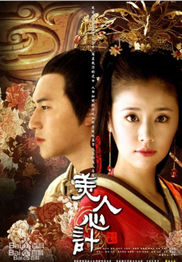
Technically, I'm not spoiling that much, since the general outline of the drama is based on history that you can get off Wikipedia or Baidu (China's Wikipedia), but like I said, there are plot points in the drama that definitely did not really happen.
The drama (cover picture on left) begins with a dramatic procession following a lady into the castle walls of the Royal Palace (below). The actress Dai Chun Rong (戴春荣) played the part of Empress Lu Zhi (吕雉), wife of the first Han Emperor, Emperor Gaozu of Han (汉高祖 also known by his personal name of Liu Bang).
Note: I am using the Chinese style of naming, where the family name is first and the personal name is last. Liu Bang, for example, has the family name of Liu (刘) and the personal name of Bang (邦).
The drama (cover picture on left) begins with a dramatic procession following a lady into the castle walls of the Royal Palace (below). The actress Dai Chun Rong (戴春荣) played the part of Empress Lu Zhi (吕雉), wife of the first Han Emperor, Emperor Gaozu of Han (汉高祖 also known by his personal name of Liu Bang).
Note: I am using the Chinese style of naming, where the family name is first and the personal name is last. Liu Bang, for example, has the family name of Liu (刘) and the personal name of Bang (邦).
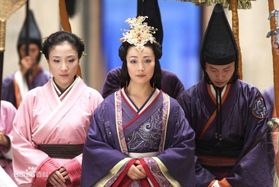 Lu Zhi (center) looking appropriately evil and dangerous.
Lu Zhi (center) looking appropriately evil and dangerous. Remember when I talked about Da Ji (妲己) last time? (To jog your memory, she was the evil nine-tailed fox demon who brought about the ruin of the Shang Dynasty.) Lu Zhi is usually lumped in with Da Ji. They were respectively the most hated women on their times, and for very good reasons. Lu Zhi is probably most infamous for the fate of her former rival for Emperor Gaozu's affections, Consort Qi (戚夫人). They both had sons, and while Empress Lu's son was named Crown Prince, Emperor Gaozu had been considering demoting Lu Zhi's son in favor of Consort Qi's son before he died. This plus the fact that Emperor Gaozu favored Consort Qi more than Lu Zhi resulted in Lu Zhi hating Consort Qi with a burning passion.
And I mean with a BURNING passion. After Emperor Gaozu died, the now Dowager Empress Lu Zhi had Consort Qi humiliated…by cutting off all of her hands and feet and facial features. She also killed Consort Qi's son Liu Ruyi (刘如意), in spite of the fact that he had been sent far away from the capitol to his own principality by Emperor Gaozu, who feared Lu Zhi would do something like that out of jealousy after his death.
So after that description I'm sure you can imagine what happened in Schemes of a Beauty. Lu Zhi's first scene in that drama consisted of her manhandling a young boy--Liu Heng (刘恒), yet another son of Emperor Gaozu by Consort Bo (薄姬), yet another consort of Emperor Gaozu--and planning to kill him because he was growing up too quickly and therefore could become a problem to her own son's ascension to the throne.
She then acted (because Lu Zhi if nothing else was a woman of action) by giving the boy's nurse--who by the way is the start of the made-up characters, played by Taiwanese actress Ruby Lin (林心如)--some poisonous rouge in the hopes that the nurse would accidentally poison her charge. But her plans fall apart, and the nurse flees along with her young daughter. Lu Zhi sends hit men after her to stop her from spreading rumors, and the nurse is forced to jump off a cliff. Her young daughter (the nurse's, not Lu Zhi's, though Lu Zhi also has a daughter) survives with the help of a kind couple, who were unfortunately murdered by the hit men not long after.
The nurse's daughter, Du Yunxi, befriends the now-orphaned daughter of her saviors, Nie Shen'er. They go to Yunxi's uncle's house for refuge, but Yunxi's malicious aunt persuades her husband to abandon Shen'er, saying that she is only a burden.
Fast forward several years, and Yunxi and Shen'er are both grown up, Yunxi as a hard-working girl in her uncle's household who is often bullied by her mean aunt and cousin, and Shen'er in a house of ill repute as a, well...
So after that description I'm sure you can imagine what happened in Schemes of a Beauty. Lu Zhi's first scene in that drama consisted of her manhandling a young boy--Liu Heng (刘恒), yet another son of Emperor Gaozu by Consort Bo (薄姬), yet another consort of Emperor Gaozu--and planning to kill him because he was growing up too quickly and therefore could become a problem to her own son's ascension to the throne.
She then acted (because Lu Zhi if nothing else was a woman of action) by giving the boy's nurse--who by the way is the start of the made-up characters, played by Taiwanese actress Ruby Lin (林心如)--some poisonous rouge in the hopes that the nurse would accidentally poison her charge. But her plans fall apart, and the nurse flees along with her young daughter. Lu Zhi sends hit men after her to stop her from spreading rumors, and the nurse is forced to jump off a cliff. Her young daughter (the nurse's, not Lu Zhi's, though Lu Zhi also has a daughter) survives with the help of a kind couple, who were unfortunately murdered by the hit men not long after.
The nurse's daughter, Du Yunxi, befriends the now-orphaned daughter of her saviors, Nie Shen'er. They go to Yunxi's uncle's house for refuge, but Yunxi's malicious aunt persuades her husband to abandon Shen'er, saying that she is only a burden.
Fast forward several years, and Yunxi and Shen'er are both grown up, Yunxi as a hard-working girl in her uncle's household who is often bullied by her mean aunt and cousin, and Shen'er in a house of ill repute as a, well...
It seems that fate really has it out for Shen'er (played by Wang Li Kun (王丽坤), who also starred in some of my favorite WWII dramas!) and Yunxi (also played by Ruby Lin; normally, Chinese dramas transcend generations and mothers and daughters are played by the same actress…unless they are both adults at the same time and have scenes together, of course) because when they meet again, its right after Shen'er killed Yunxi's husband-to-be out of woman-scorned-jealousy and is now fleeing the authorities. Yunxi, who somehow remembers and recognizes Shen'er, is on her way to become a serving girl at the Royal Palace, and she persuades the head eunuch in charge of them to let Shen'er stay to replace another serving girl who had committed suicide.
In the palace, Yunxi quickly rises to favor with the youthful Empress Yan (张嫣), the child wife of Emperor Hui of Han (汉惠帝, and Lu Zhi's son), due to her kindness and cleverness. Shen'er, meanwhile, plots various plots on how to get the Emperor to notice her so that she can "fly to the top and become a phoenix" (飞上枝头变凤凰).
Hm. Awkward. That Chinese idiom doesn't really translate. In ancient China, the phoenix was the empress, while the dragon represented the emperor. To "fly to the top and become a phoenix" is to be noticed by the emperor and become one of his consorts, which was considered the ultimate honor.
Anyhow, Shen'er's plots accidentally make Lu Zhi aware of Yunxi's (and by extension Shen'er's) existence(s)…never a good thing. Fortunately for Yunxi, Lu Zhi is impressed with her resourcefulness and decides to keep her near the young Empress Yan in an attempt to help the Empress conceive (crazy, I know, but what's crazier is that Empress Yan was Emperor Hui's pseudo-niece, being the daughter of his sister's husband's concubine). This, naturally, makes Emperor Hui notice Yunxi and of course, they fall in love. On his side, anyway.
So things happen, but Yunxi and Shen'er remain happy BFFs until Lu Zhi realizes that her son has fallen in love with Yunxi and forces her to drink poison because she doesn't want him falling in love with anyone who is intelligent/of childbearing age. Except Yunxi doesn't actually die, because that would make the drama very boring if the female lead dies within the first few episodes. After being dosed with a sleeping potion, Yunxi (now under the fake name of Dou Yifang) is sent to the principality of Dai to spy on (who else?) Liu Heng, now the King of Dai.
Hm. Awkward. That Chinese idiom doesn't really translate. In ancient China, the phoenix was the empress, while the dragon represented the emperor. To "fly to the top and become a phoenix" is to be noticed by the emperor and become one of his consorts, which was considered the ultimate honor.
Anyhow, Shen'er's plots accidentally make Lu Zhi aware of Yunxi's (and by extension Shen'er's) existence(s)…never a good thing. Fortunately for Yunxi, Lu Zhi is impressed with her resourcefulness and decides to keep her near the young Empress Yan in an attempt to help the Empress conceive (crazy, I know, but what's crazier is that Empress Yan was Emperor Hui's pseudo-niece, being the daughter of his sister's husband's concubine). This, naturally, makes Emperor Hui notice Yunxi and of course, they fall in love. On his side, anyway.
So things happen, but Yunxi and Shen'er remain happy BFFs until Lu Zhi realizes that her son has fallen in love with Yunxi and forces her to drink poison because she doesn't want him falling in love with anyone who is intelligent/of childbearing age. Except Yunxi doesn't actually die, because that would make the drama very boring if the female lead dies within the first few episodes. After being dosed with a sleeping potion, Yunxi (now under the fake name of Dou Yifang) is sent to the principality of Dai to spy on (who else?) Liu Heng, now the King of Dai.
Ahh! Fate! Destiny! I was so sure they would see each other and the drama would turn into a mushy-I-can't-believe-we-are-destined-by-the-stars-to-be-together-love-story but it didn't. So how exactly did Yunxi recognize Shen'er but not Liu Heng?
Either way, Lu Zhi didn't trust Yunxi/Yifang or her loyalty enough, so she a spy to spy on Yunxi/Yifang, so she wasn't exactly in any position to fall in love with Liu Heng (really sad 'cause he loved her). Lu Zhi also kept Shen'er back in the capital with her as a hostage, plus the aunt of the girl she sent to spy on Yunxi/Yifang, Mo Xueyuan (莫雪鸢, played by Yang Mi), who doubled as a bodyguard due to her crazy fighting skills. But true love conquers all, and Yifang (as I will heretofore call her) and Liu Heng prevail in spite of all of the obstacles (read: Lu Zhi and her schemes). Xueyuan also becomes true friends with Yifang and helps her send fake reports to Lu Zhi (schemes of beauties…hint, hint). Plus Xueyuan falls in love with Zhou Yafu (played by Mickey He), a general under Liu Heng.
Their story ends in the tragedy, but they also had some awesome fighting scenes and plus I don't think that Xueyuan was real though Zhou Yafu was so--
Either way, Lu Zhi didn't trust Yunxi/Yifang or her loyalty enough, so she a spy to spy on Yunxi/Yifang, so she wasn't exactly in any position to fall in love with Liu Heng (really sad 'cause he loved her). Lu Zhi also kept Shen'er back in the capital with her as a hostage, plus the aunt of the girl she sent to spy on Yunxi/Yifang, Mo Xueyuan (莫雪鸢, played by Yang Mi), who doubled as a bodyguard due to her crazy fighting skills. But true love conquers all, and Yifang (as I will heretofore call her) and Liu Heng prevail in spite of all of the obstacles (read: Lu Zhi and her schemes). Xueyuan also becomes true friends with Yifang and helps her send fake reports to Lu Zhi (schemes of beauties…hint, hint). Plus Xueyuan falls in love with Zhou Yafu (played by Mickey He), a general under Liu Heng.
Their story ends in the tragedy, but they also had some awesome fighting scenes and plus I don't think that Xueyuan was real though Zhou Yafu was so--
I'm getting off topic.
Back to the drama. Fast forward through a lot more, and Emperor Hui dies (read: leaves the palace with everyone thinking him dead) and everyone rebels against Lu Zhi, and in the end of the chaos, Liu Heng, King of Dai, becomes Emperor Wen of Han.
Unfortunately, Shen'er survived the death of Lu Zhi and the chaos that followed and somehow finagles her way bak into the Royal Palace, where she is welcomed by Yifang. But what Yifang doesn't know is that Shen'er has lost all of her morals (though you could argue she never had any…after all she started her adult life by committing murder...) and Shen'er eventually ends up as Emperor Wen's consort.
In actual life, Emperor Wen did have a Consort Shen, but I'm pretty sure she wasn't as evil as the Shen'er in the drama. I'm also pretty sure that Consort Shen did not have the complicated backstory with the Empress Dou (Yifang's title) but then again, Chinese dramas = rewrite of history, more or less.
Blah, blah, blah, Shen'er eventually is killed after her evil schemes push Yifang a bit too far (more specifically: Shen'er kills Xueyuan and Yifang decides she's had enough), Emperor Wen of Han dies a little later and his and Yifang's son Liu Qi takes over as Emperor Jing of Han. And here's where the screenwriters really begin to take creative license: Emperor Jing falls in love with Shen'er daughter, who is now called Wang Zhi.
See, during the chaos at the end of Lu Zhi's life, Shen'er got mixed up with one of Lu Zhi's nephews called Lu Lu and they had a daughter who was taken away in the chaos by Xueyuan's aunt and raised away from the palace ignorant of her true parentage.
So some more blah, blah in the next generation, the most exciting of which involved Emperor Jing's favored Consort Li manipulating his Empress Bo into trying to kill Consort Wang. In the end, Consort Li is discovered, and Consort Wang's son is made Crown Prince. Emperor Jing dies, and Consort Wang's son Liu Che ascends as Emperor Wu of Han. Finally, we see young girl who just enters the palace; her name is Wei Zifu, and she is future Empress Wei, wife of Emperor Wu.
Back to the drama. Fast forward through a lot more, and Emperor Hui dies (read: leaves the palace with everyone thinking him dead) and everyone rebels against Lu Zhi, and in the end of the chaos, Liu Heng, King of Dai, becomes Emperor Wen of Han.
Unfortunately, Shen'er survived the death of Lu Zhi and the chaos that followed and somehow finagles her way bak into the Royal Palace, where she is welcomed by Yifang. But what Yifang doesn't know is that Shen'er has lost all of her morals (though you could argue she never had any…after all she started her adult life by committing murder...) and Shen'er eventually ends up as Emperor Wen's consort.
In actual life, Emperor Wen did have a Consort Shen, but I'm pretty sure she wasn't as evil as the Shen'er in the drama. I'm also pretty sure that Consort Shen did not have the complicated backstory with the Empress Dou (Yifang's title) but then again, Chinese dramas = rewrite of history, more or less.
Blah, blah, blah, Shen'er eventually is killed after her evil schemes push Yifang a bit too far (more specifically: Shen'er kills Xueyuan and Yifang decides she's had enough), Emperor Wen of Han dies a little later and his and Yifang's son Liu Qi takes over as Emperor Jing of Han. And here's where the screenwriters really begin to take creative license: Emperor Jing falls in love with Shen'er daughter, who is now called Wang Zhi.
See, during the chaos at the end of Lu Zhi's life, Shen'er got mixed up with one of Lu Zhi's nephews called Lu Lu and they had a daughter who was taken away in the chaos by Xueyuan's aunt and raised away from the palace ignorant of her true parentage.
So some more blah, blah in the next generation, the most exciting of which involved Emperor Jing's favored Consort Li manipulating his Empress Bo into trying to kill Consort Wang. In the end, Consort Li is discovered, and Consort Wang's son is made Crown Prince. Emperor Jing dies, and Consort Wang's son Liu Che ascends as Emperor Wu of Han. Finally, we see young girl who just enters the palace; her name is Wei Zifu, and she is future Empress Wei, wife of Emperor Wu.
And it all ends.
But it doesn't!
But it doesn't!
Beautiful Lies: The Prequel
Because it wasn't enough for Yu Zheng (producer of Schemes of a Beauty) to stick with one Han drama, we got another one that was supposed to act as a prequel, relating the lives and stories of Lu Zhi and Emperor Gaozu.
Actually, on second thought, we got two prequels that were exactly the same except for the actors. And I mean exactly the same. The plot. The love triangle. Even the lines the actors used were the same.
Actually, on second thought, we got two prequels that were exactly the same except for the actors. And I mean exactly the same. The plot. The love triangle. Even the lines the actors used were the same.
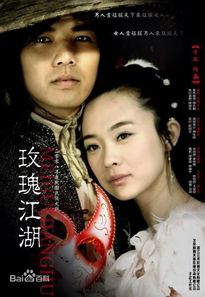 Urgh. Wrong couple, people.
Urgh. Wrong couple, people. The first one is called Mei Gui Jiang Hu (玫瑰江湖, or Rose of the Rivers and Lakes, literally, though jianghu also refers to the world of martial artists in Chinese culture).
One of the promo covers is on the left. Starring Wallace Chung and Huo Siyan (shown) who play the roles that represent, well, we'll get to there. Huo Siyan plays Lu Zhi (young) and she really does bear a resembles to the Lu Zhi in Schemes of a Beauty.
I can't say much about this because I've only seen the first episode, but let's just say that it included a ridiculously weird plot line that was compounded by the fact that Yu Zheng tried to write about the Han Dynasty set in the twentieth century, so instead of emperors, we have drug lords and gang bosses.
I think.
Like I said, I only watched a bit. But that doesn't matter, because I watched the other prequel (which has the exact same storyline!) a little more. It's called Wang De Nu Ren (王的女人), or Beauties of the Emperor (was there not one ugly woman in China's imperial past?). Starring Ming Dao (明道), Yuan "Mabel" Shanshan (袁姗姗), and Joe Chen (陈乔恩).
One of the promo covers is on the left. Starring Wallace Chung and Huo Siyan (shown) who play the roles that represent, well, we'll get to there. Huo Siyan plays Lu Zhi (young) and she really does bear a resembles to the Lu Zhi in Schemes of a Beauty.
I can't say much about this because I've only seen the first episode, but let's just say that it included a ridiculously weird plot line that was compounded by the fact that Yu Zheng tried to write about the Han Dynasty set in the twentieth century, so instead of emperors, we have drug lords and gang bosses.
I think.
Like I said, I only watched a bit. But that doesn't matter, because I watched the other prequel (which has the exact same storyline!) a little more. It's called Wang De Nu Ren (王的女人), or Beauties of the Emperor (was there not one ugly woman in China's imperial past?). Starring Ming Dao (明道), Yuan "Mabel" Shanshan (袁姗姗), and Joe Chen (陈乔恩).
Wang De Nu Ren is essentially a reenactment of Mei Gui Jiang Hu except the setting is in ancient China instead of semi-modern China, so things made a teensy-weensy more sense.
I say a teensy-weensy because Yu Zheng made Lu Zhi (played by Joe Chen) still in a love triangle with her historical husband Liu Bang (Emperor Gaozu of Han) and….wait for it…Xiang Yu, King of Chu.
WHAT?!?!
(For those of you who don't know, Xiang Yu was Liu Bang's greatest contender for the position of emperor after the fall of the Qin Dynasty. And he never so much as met Lu Zhi. Plus he had more than enough wives of his own. There's actually a famous Chinese play turned into a movie that describes the end of Xiang Yu and his wife Consort Yu at the end of their lives.)
Worst of all, Yu Zheng had to change the names of all of the main characters (Lu Zhi, Liu Bang, Xiang Yu, etc) because apparently you can't rework history to this extent on national television. So now we end up with Lu Le (Lu Zhi), Hai Tian (Liu Bang), and Yun Kuang (Xiang Yu). The only one with a semi-real name was Yu Miaoge (Consort Yu), because I didn't know her actual name at the time, so I could accept imagining it as Miaoge. But it turned out that Yu Miaoge and Lu Zhi were pseudo-sisters/BFFs (like Shen'er and Yifang/Yunxi in Schemes of a Beauty).
Gah! In retrospect, I liked Mei Gui Jiang Hu better. At least you could imagine that it was a story instead of a bad reworking of Chinese history that makes no sense whatsoever.
Plus, in Beauties of an Emperor the love triangle between Lu Zhi-Liu Bang-Xiang Yu was complicated by the fact that Xiang Yu had a love triangle of his own: with Yu Miaoge and Liu Zhi. Absolutely hated that.
I really don't get why Yu Zheng seems like Yuan Shanshan and Joe Chen being on opposite sides of a love triangle, or why he likes for the guy in the triangle to choose Yuan Shanshan every…single…time…sorry, rambling again, but if you ever watch Swordman [sic] you'll get what I'm saying.
Below: Joe Chen (left), Yuan Shanshan (right)
I say a teensy-weensy because Yu Zheng made Lu Zhi (played by Joe Chen) still in a love triangle with her historical husband Liu Bang (Emperor Gaozu of Han) and….wait for it…Xiang Yu, King of Chu.
WHAT?!?!
(For those of you who don't know, Xiang Yu was Liu Bang's greatest contender for the position of emperor after the fall of the Qin Dynasty. And he never so much as met Lu Zhi. Plus he had more than enough wives of his own. There's actually a famous Chinese play turned into a movie that describes the end of Xiang Yu and his wife Consort Yu at the end of their lives.)
Worst of all, Yu Zheng had to change the names of all of the main characters (Lu Zhi, Liu Bang, Xiang Yu, etc) because apparently you can't rework history to this extent on national television. So now we end up with Lu Le (Lu Zhi), Hai Tian (Liu Bang), and Yun Kuang (Xiang Yu). The only one with a semi-real name was Yu Miaoge (Consort Yu), because I didn't know her actual name at the time, so I could accept imagining it as Miaoge. But it turned out that Yu Miaoge and Lu Zhi were pseudo-sisters/BFFs (like Shen'er and Yifang/Yunxi in Schemes of a Beauty).
Gah! In retrospect, I liked Mei Gui Jiang Hu better. At least you could imagine that it was a story instead of a bad reworking of Chinese history that makes no sense whatsoever.
Plus, in Beauties of an Emperor the love triangle between Lu Zhi-Liu Bang-Xiang Yu was complicated by the fact that Xiang Yu had a love triangle of his own: with Yu Miaoge and Liu Zhi. Absolutely hated that.
I really don't get why Yu Zheng seems like Yuan Shanshan and Joe Chen being on opposite sides of a love triangle, or why he likes for the guy in the triangle to choose Yuan Shanshan every…single…time…sorry, rambling again, but if you ever watch Swordman [sic] you'll get what I'm saying.
Below: Joe Chen (left), Yuan Shanshan (right)
Beauty of Lies: The Sequel
Obviously, the Han Dynasty didn't end with Emperor Wu. So what happened after? Well, curious fans-of-Chinese-history-and/or-Chinese-dramas, you'll get your question answered next summer by the new drama Da Han Qing Yuan Zhi Yun Zhong Ge (大汉清远之云中歌). Also known by the official translation of Love From the Yunge Desert. Not sure if I got that official translation correct, and I don't care enough to recheck. I hate the new title Yu Zheng is giving it anyways.
In case you were wondering, this new drama will also be produced by Yu Zheng.
In case you were wondering, this new drama will also be produced by Yu Zheng.
It's based off a romance novel by Chinese author Tong Hua called Yun Zhong Ge, which means Song in the Clouds (very nice title! Yu Zheng, you should keep it for the drama!). Song in the Clouds is about Yun Ge (the protagonist, whose name literally means Cloud Song) and her love triangle (never a romance without a love triangle…sigh) which includes Emperor Zhao of Han and this other guy called Meng Jue. And sort of Liu Bingyi.
Emperor Zhao, historically, was the youngest son of Emperor Wu. He became emperor at eight years old, after Emperor Wu killed: his Empress Wei Zifu, their son the Crown Prince Liu Ju, the entire family of Liu Ju, the entire family of Wei Zifu, and Emperor Zhao's own mother as well (for fear she would turn out like Lu Zhi. That old lady might have been long dead by then, but she was still fresh in the minds of everyone).
But poor Emperor Zhao dies early in life (sixteen, I think?), and succeeding him was his great-nephew, the grandson of the dead former Crown Prince Liu Ju, Liu Bingyi, who was known as Emperor Xuan of Han. Liu Bingyi had a very eventful youth after his grandfather Liu Ju was killed for treason against Emperor Wu and he himself went from royalty to commoner to royalty again.
I am paradoxically super excited for Yun Zhong Ge, movie-version. I'm not entirely sure why…oh well. Just keeping my fingers crossed that its as good as Schemes of a Beauty and Yuan 33 doesn't get switched in at the last minute.
Emperor Zhao, historically, was the youngest son of Emperor Wu. He became emperor at eight years old, after Emperor Wu killed: his Empress Wei Zifu, their son the Crown Prince Liu Ju, the entire family of Liu Ju, the entire family of Wei Zifu, and Emperor Zhao's own mother as well (for fear she would turn out like Lu Zhi. That old lady might have been long dead by then, but she was still fresh in the minds of everyone).
But poor Emperor Zhao dies early in life (sixteen, I think?), and succeeding him was his great-nephew, the grandson of the dead former Crown Prince Liu Ju, Liu Bingyi, who was known as Emperor Xuan of Han. Liu Bingyi had a very eventful youth after his grandfather Liu Ju was killed for treason against Emperor Wu and he himself went from royalty to commoner to royalty again.
I am paradoxically super excited for Yun Zhong Ge, movie-version. I'm not entirely sure why…oh well. Just keeping my fingers crossed that its as good as Schemes of a Beauty and Yuan 33 doesn't get switched in at the last minute.
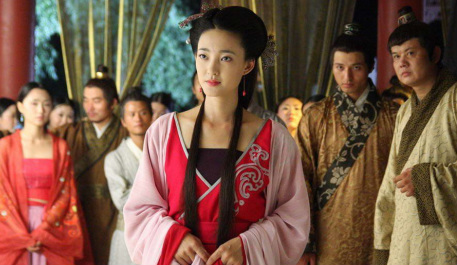
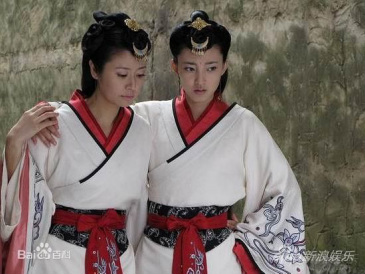
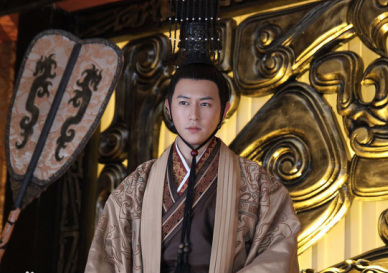
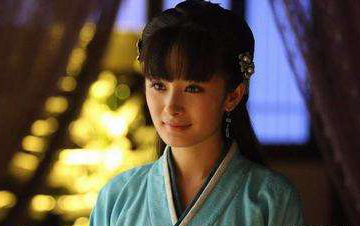
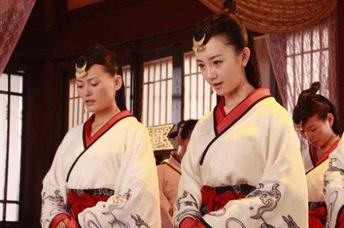
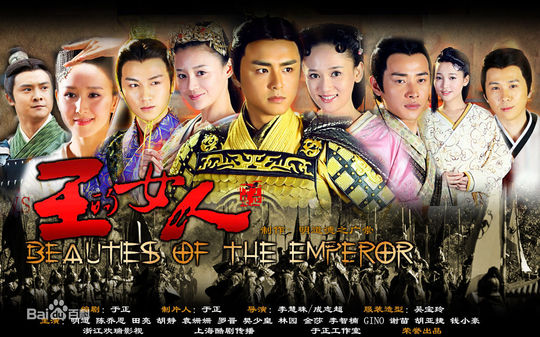

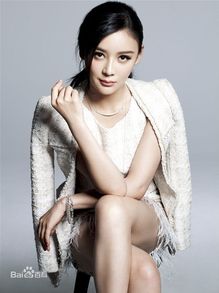
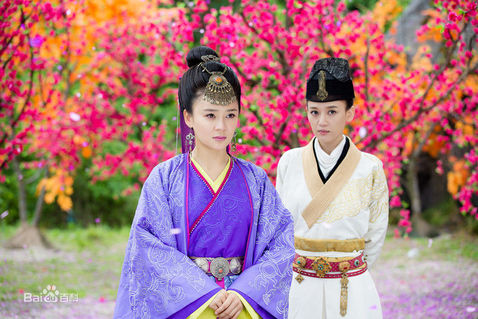
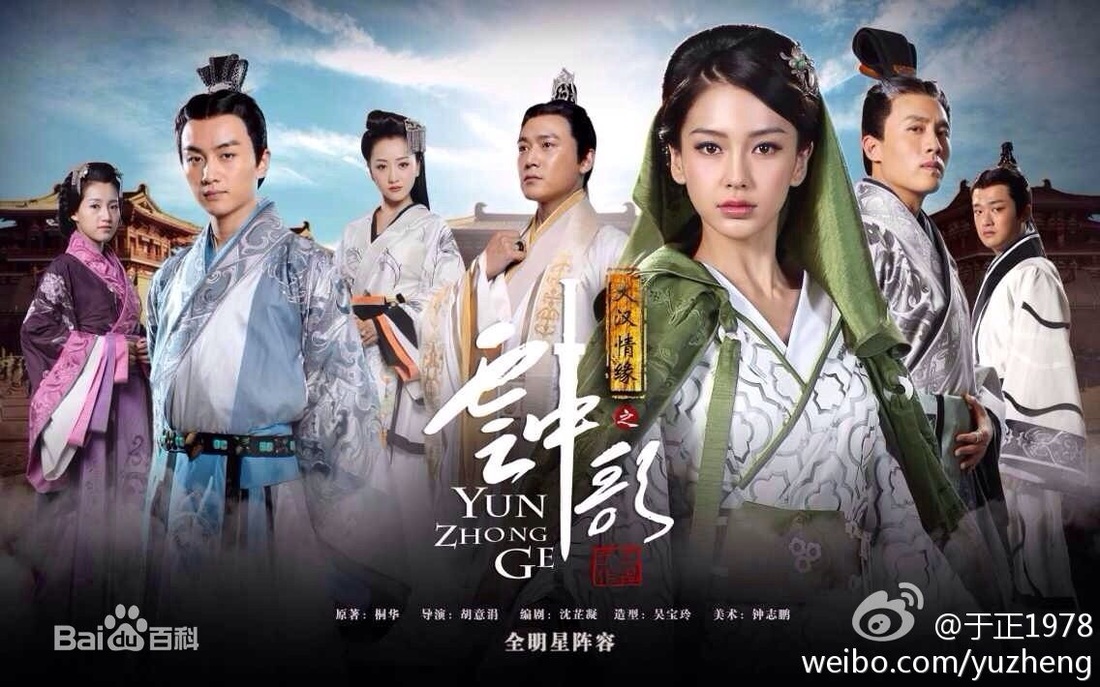

 RSS Feed
RSS Feed
